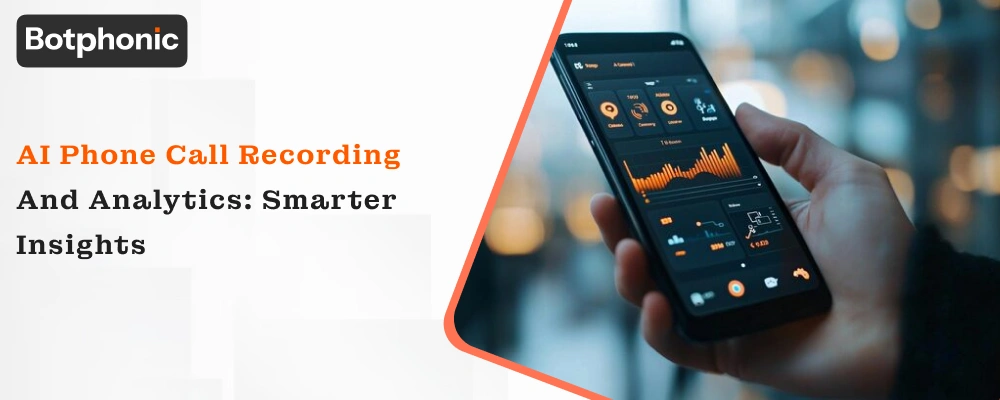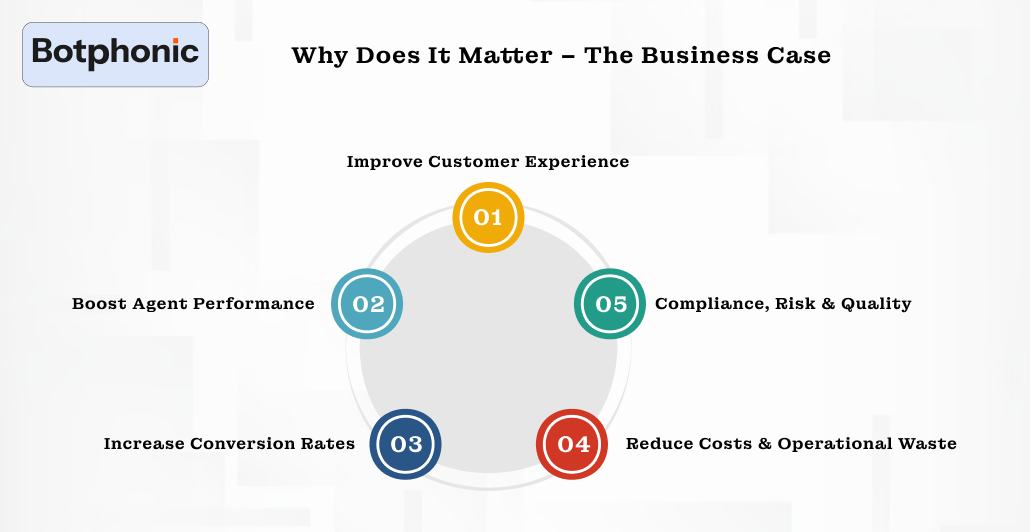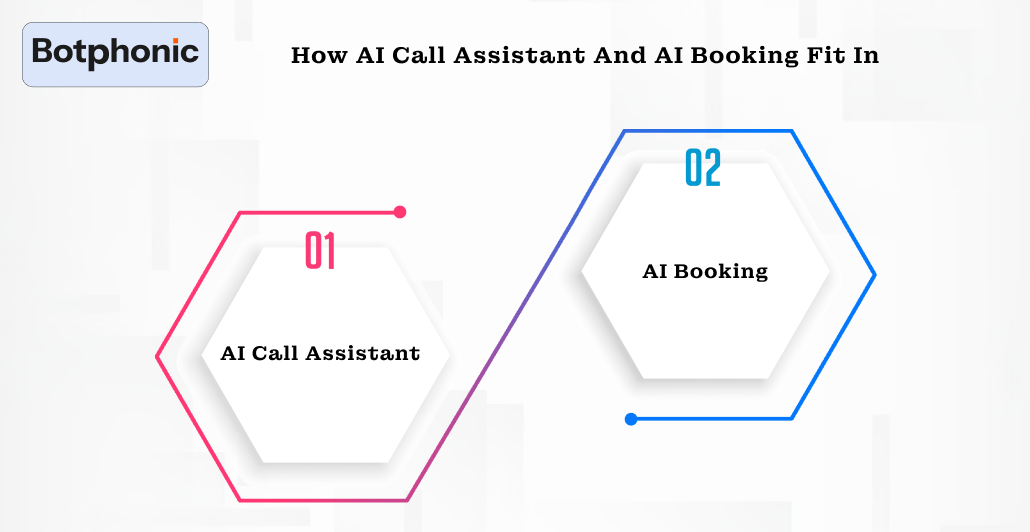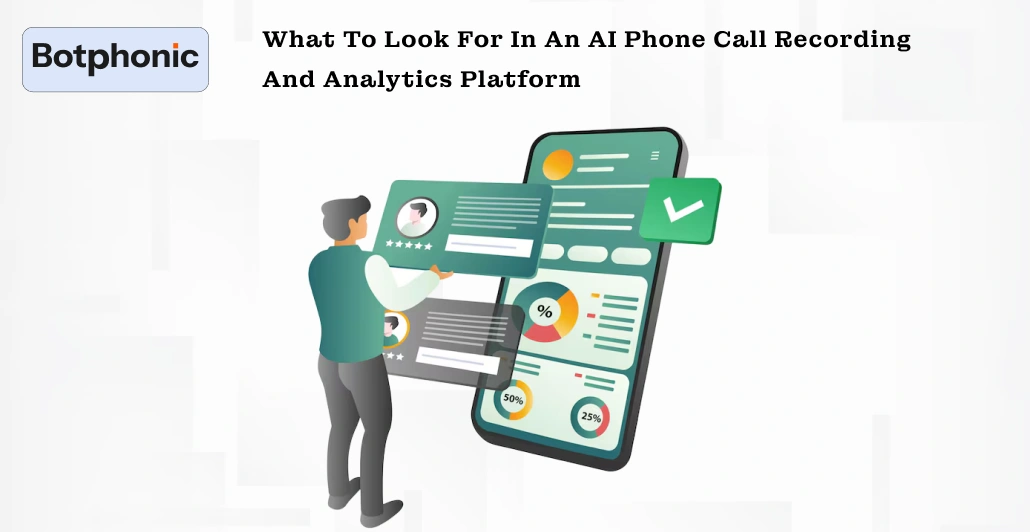
Summarize Content With:
Summary
We highlight in this blog how AI-powered phone call recording and analytics can revolutionise the way a business communicates. In addition to the main aspects of technology, we also discuss its implementation with a Botphonic AI solution.
Key Takeaways
- Learn the foremost skills of AI phone call recording and analytics and their necessity for your organisation.
- How the features of an AI call assistant and AI booking, combined with call recording and analytics, result in a seamless workflow.
- Reasonable ways to select, install, and upgrade this technology in your club.
- Understanding how Botphonic AI is geared towards such features enables you to make your moves immediately and get insight at a glance.
Introduction
Have you ever thought it would be nice to hear every customer call and instantly gain insights into their mood, intentions, and overlooked opportunities, then be able to act immediately? That is the essence of AI phone call recording and analytics. A few manual reviews cannot be your modus operandi in a world where every second counts.
You need smart automation. Through this blog, we explain the concept of AI call recording and analytics, their importance, working mechanism, solution selection, and best practices for success. This is Botphonic AI’s contribution to the field.
What is AI Phone Call Recording and Analytics?
To keep it simple, AI phone call recording and analytics refer to the process of recording both your inbound and outbound phone conversations and then applying artificial intelligence (AI) to analyse those recordings and generate useful data from them.
The AI finds the transcript for the captured voice, identifies the feeling, looks up the keywords, analyses the conversational flow, and provides you with insightful dashboards and reports. Their phrase is not just “we recorded a call.” It’s “we learned from every call.”
call.”
This is because calls are packed with information, including customer questions, agent responses, points where deals fall, and new leads that turn into customers. If all you do is record and store, then you are throwing away most of that treasure. Analytics, however, provide a way to transform voice data into actionable business intelligence.
That typically looks like:
- A call is recorded (whether it’s an incoming or an outgoing one).
- The audio gets transcribed (human speech is converted into text).
- The AI analyses: sentiment, intent, keywords, and patterns.
- The system provides summaries, reports, keywords, and alerts.
- You apply that insight to guide agents, modify scripts, adjust workflows, and boost conversions.
One example is the 2025 research, which revealed that AI call recording tools could relieve small business owners from the tedious task of reviewing hours of recordings by providing automatic transcripts and sentiment tagging.
Why Does It Matter – The Business Case

You ask, “Why put money into AI phone call recording and analytics?” Here are the primary reasons.
1. Improve Customer Experience
When you review call data, you identify customer issues. Maybe customers demand waiting times or question something that has already been answered. With insights, you get rid of these problems. That results in satisfied customers and more loyalty.
2. Boost Agent Performance
It’s not possible to manually listen to every phone call. However, using AI Phone Call Technology, businesses can highlight the negative aspects of customer-agent interactions. This statement, “Agent interrupted customer 4 times,” helps you pinpoint the interaction on which you can do agent training, as it is based on real data.
3. Increase Conversion Rates
The source of the majority of sales is calls. Artificial Intelligence (AI) call analytics provide the information on which sales behaviors and utterances lead to conversions. Then you start to use the successful approach. For instance, one platform discovered that identifying lead intent in phone calls facilitates better cooperation between marketing and sales.
4. Reduce Costs & Operational Waste
You achieve automation of transcription, summarisation, and tagging, which saves a lot of manual work. The process of resolution is completed more quickly, along with a reduction in errors. Your current employees will be able to handle more calls and, therefore, the need to hire additional staff will be eliminated.
5. Compliance, Risk & Quality Assurance
Call recording and analytics give you the tools for monitoring compliance (e.g., in tightly-regulated industries). You mitigate the risk of missing disclosures, provide consistent messaging, and perform tightly regulated quality checks with ease. As one post points out, “Check the vendor’s data security protocols, encryption standards, and compliance with GDPR/CCPA” when selecting a platform.
How AI Call Assistant and AI Booking Fit In

When you hear the words “AI call assistant” and “AI booking,” you may think of them as quite different from analytics. In reality, they can work together seamlessly with AI phone call recording and analytics. Let’s find out.
1. AI Call Assistant
An AI call assistant is a virtual voice assistant that supports both inbound and outbound calls, answering questions, qualifying leads, providing call routing, booking appointments, and performing follow-ups. In the case of Botphonic AI, features include human-AI conversation, multi-language support, outbound/inbound calling, and calendar booking.
Once the assistant is up and running, it is possible to record and analyse any calls that it participates in. In that sense, you achieve a complete system: AI takes over the interaction, while analytics learn from it.
2. AI Booking
By AI booking, we mean a system that schedules appointments, meetings, or callbacks automatically. It could be that the assistant checks the calendar, asks the customer when a good time would be, and then places the booking. Booking calls is just another part of the conversation data.
Suppose you integrate booking with call recording and analytics. In that case, you can gain insight into the efficiency of scheduling, such as which workflows are the fastest at booking, where there is a drop-off in booking calls, what types of leads are booking and which are not. You have the opportunity to optimise booking scripts and flows.
Combined Flow:
- A lead reaches out to you (or you lead the call) via the AI call assistant.
- The interaction is electronically saved and then transformed into text form.
- The tool recognises the feelings and goals of the speaker (“book appointment,” “need demo,” “pricing query”).
- The AI assistant completes the booking (if the goal is an appointment) or connects to a human agent.
- Analytics track which calls resulted in bookings, which did not, and the reasons.
- You tweak call scripts, booking flows, calendar slots, and follow-ups.
How components relate
| Component | Role | Data it feeds into analytics |
| AI Call Assistant | Handles live voice interaction | Conversation patterns, call handling metrics |
| Call Recording | Captures audio of the conversation | Raw data for transcription/analysis |
| Call Transcription | Converts audio to text | Enables keyword/intent/sentiment tagging |
| Call Analytics | Outputs insights, KPIs, alerts | Drives coaching, optimisation, decision making |
| AI Booking | Schedules meetings/callbacks automatically | Booking success metrics, workflow insights |
What to Look for in an AI Phone Call Recording and Analytics Platform

With so many providers available, you must make a wise choice. These are the main.
Key Features to Evaluate
- Recording and Transcription – A platform should be able to reliably record calls (on both sides) and transcribe them with high accuracy.
- Analytics & Insights – The system should be able to identify changes in the speaker’s mood, interruptions, topic switching, keywords, user intent, and lead scoring. For instance, a blog claims that AI call analysis tools should not be limited to simple recording and transcription but should also be in a position to “spot key moments in conversations, understand sentiment, and provide trends”.
- AI Call Assistant / Booking Capabilities – The system should have functionalities such as automated inbound/outbound calls, appointment scheduling, and routing.
- Multilingual Support – This feature is particularly useful when targeting different areas or languages. For example, Botphonic AI supports multiple languages.
- Integration with Other Systems – Without a hitch, API or native integrations with CRM, marketing tools, calendars, IVR, SIP.
- Compliance & Security – The company must comply with regulations such as GDPR, PCI-DSS, and HIPAA (if applicable). Encryption, access controls, and audits. Botphonic is a compliant entity for PCI DSS, GDPR, and HIPAA.
Don’t let those important conversations with customers pass without hearing them. Botphonic AI allows you to record, analyse, and act on every call in real-time. Uncover the true feelings of your customers, increase conversions, and make more intelligent decisions using the data you have at the moment.
Try Today!Final Thoughts
To sum up, Artificial Intelligence-powered phone call recording, together with the analytics feature, provides businesses with a potent tool to comprehend customer interactions and thereby make more informed decisions. These AI-enabled phone call recording and analytics tools, when used in conjunction with AI call assistant and AI-enabled booking tools, not only convert habitual calls into insightful data but also help improve customer experience, sales, and operational efficiency.
They free you from the need to guess the contents of the calls and instead provide you with actual, actionable data almost instantly. Botphonic AI, among others, facilitates this transition effortlessly by offering a comprehensive solution that includes intelligent recording, analytics, booking automation, and regulatory compliance. So, if you want to improve your communications, save some time, and grow at a faster pace, now would be the perfect moment to introduce AI in each of your calls.

